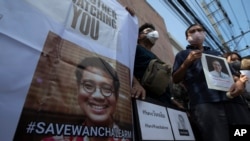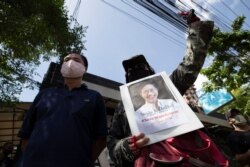Early this year Thai pro-democracy activist Wanchalearm Satsaksit told his sister he felt as if he were being followed by three men who looked like Thai police officers.
Wanchalearm had arrived in Cambodia in 2014, fleeing a warrant for failure to report to a military camp for dissidents after a coup. He is now missing.
“They are in the circles where these threats are common,” his sister, Sitanun Satsaksit, told VOA Khmer. She added that her brother didn’t seem very worried at the time, which she recalled as being “before COVID.”
On May 13, Thai police visited their mother’s home in Ubon Ratchathani, a city in northeastern Thailand. They asked about Wanchalearm’s whereabouts. The Thai activist immediately took to Facebook to mock the police officers for “performing their duties.”
“This might have been the last straw,” Sitanun said during a video call November 16 with VOA. She added that she believes the satirical post pushed Thai authorities to act.
Her brother made his last Facebook post June 3, taunting Thai Prime Minister Prayuth Chan-ocha in Isan, the language of northeastern Thailand. His delivery seems friendly, but his words are profane.
CCTV footage from June 4 shows a black SUV speeding away from Wanchalearm’s home in Phnom Penh’s Chroy Changvar district. Eyewitnesses who identified Wanchalearm told VOA Khmer that three men had forced him into the vehicle before it took off.
The Thai activist has not been seen since.
Sitanun arrived in Phnom Penh in early November to attend a December 8 hearing at the Phnom Penh Municipal Court into Wanchalearm’s alleged disappearance. She plans to present evidence and push for a fuller investigation into the incident.
“I want to find the truth about my brother,” she told VOA, “I don’t really know what to expect.”
She said she knows only that as she spoke to Wanchalearm the day he disappeared, she heard men speaking in a language that was not Thai in the background.
“He said, ‘I can’t breathe, I can’t breathe,’” she said. Worried that something was obstructing his windpipe, she told him to smack his chest to try to clear it if he couldn’t breathe.
“The next thing you know, he went off the line.”
Linking generations
Wanchalearm is the ninth self-exiled pro-democracy critic of Thailand's government and monarchy to disappear since Prayuth came to power in a military coup in 2014. The bodies of Kraidej Luelert and Chatchan Buphawan, who had fled to Laos, were found in the Mekong River in December 2018. None of the cases has been solved.
Thai officials have denied any involvement in the disappearances.
Wanchalearm was an activist affiliated with the United Front for Democracy Against Dictatorship. Also known as the Red Shirts, the group formed to protest the 2006 military coup that ousted then-prime minister Thaksin Shinawatra, who faced corruption charges before he fled the country.
Wanchalearm fled Thailand after a 2014 military coup spurred on by pro-establishment protesters, the Yellow Shirts. They mounted a massive street campaign to oust then-Prime Minister Yingluck Shinawatra, Thaksin’s sister, who also faced corruption charges and had the Red Shirts’ support. She fled and obtained Serbian citizenship in 2019.
Younger than many UDD leaders, Wanchalearm, who was 37 in June, bridged the gap to a new generation of pro-democracy protesters. He posted political satire on Facebook and, according to the Isra News Agency, an online news service that does public policy and investigative reporting and has covered the conflict in southern Thailand, he had criticized Thai King Maha Vajiralongkorn.
Thailand’s harsh lèse-majesté law punishes those who insult or criticize the monarchy with a maximum of 15 years in prison and has been used for decades to quell dissent. Thai police spokesman Kritsana Pattanacharoen denied Wanchalearm faced lèse-majesté charges.
In 2018, Thai authorities, citing the Computer Crime Act of 2016, issued an arrest warrant for Wanchalearm saying he maintained a Facebook page critical of the military government from outside Thailand. The act gives the government broad powers according to Human Rights Watch. Used to silence opposition to the government and the monarchy, it is seen as more targeted than the lèse-majesté laws, which can drag the palace into the fray.
Wanchalearm’s disappearance in June caused an uproar in Thailand, roiled by new pro-democracy street demonstrations. The hashtag # Save Wanchalearm erupted on Twitter and protesters rallied at the Cambodian embassy in Bangkok.
Hearing plans
After receiving a summons from a Cambodian investigative judge, Sin Sovannroth, Sitanun traveled to Phnom Penh with a legal team and will be represented by Cambodian lawyer Sam Chamroern at the December 8 closed-door hearing. The Thais arrived in Cambodia November 10 and are self-isolating for 14 days at a Phnom Penh hotel.
She told VOA Khmer she hopes to collect additional evidence before the hearing, where she will present proof of her brother’s residence in Phnom Penh and of his alleged abduction to the court.
After the alleged abduction, Cambodia initiated an investigation at the request of Thai authorities. Within days, Cambodian authorities questioned whether Wanchalearm had ever lived at the Mekong Garden condominium in the Chroy Changvar district. By June 10, Cambodian police were questioning his presence in Cambodia at the time of his disappearance.
Cambodian national police spokesman Lt. Gen. Chhay Kim Khoeun said that according to official records Wanchalearm was not living in Cambodia at the time of his abduction. He told Radio Free Asia “According to our investigation, Wanchalearm left Cambodia in 2017 [and did not return].”
In a submission to the United Nations Working Group on Enforced or Involuntary Disappearances, the Cambodian government said Wanchalearm’s visa had expired on December 31, 2017, and his last recorded entry into the country was on October 19, 2015. The government’s letter continued to maintain that authorities had yet to ascertain “if there was a real abduction case and if it had really happened in Cambodia.”
Sitanun said that since her brother left Thailand, she had spoken to him constantly about his life and work in Phnom Penh.
“The entire family knows. He posted about it on Facebook,” Sitanun said of his residence in Cambodia.
Two charges
Sitanun’s court summons lists two charges that are being investigated by Sin Sovannroth, unlawful arrest, detention and confinement, and unauthorized possession of weapons. The charged are “unidentified individuals” and the investigative judge will decide after hearing testimony if the case should go to trial.
Eyewitness accounts reported by VOA Khmer in June suggest that the three men involved in the alleged abduction were carrying concealed weapons.
On Wednesday, Nov. 18, Y Rin, a Phnom Penh Municipal Court spokesperson, directed VOA to query deputy prosecutor Kuch Kimlong. VOA Khmer contacted him that day, and Kuch Kimlong asked that queries be sent via Telegram, an encrypted messaging app. He has not responded to requests for comments sent as requested.
Khieu Sopheak, secretary of state at Cambodia’s Interior Ministry, said Nov. 18 that he could not comment on court proceedings and that ministry officials would aid the court in its investigation.
He said the police investigation had found no leads to suggest Wanchalearm was abducted outside his residence and that there was “no trace” of the pro-democracy activist.
“Anything that has been raised on Facebook or wherever else [about this case], there is no truth to it,” said Khieu Sopheak.
Sam Chamroeun, Sitanun’s Cambodian lawyer, said only that the prosecutor had taken note of the complaint and charged unidentified individuals with Wanchalearm’s disappearance.
“Now, it is in the hands of an investigative judge – it means the prosecutor has already pressed charges,” he said.
James Buchanan, a lecturer at Mahidol University near Bangkok, said in an email that it was unlikely the Cambodian government would conduct a serious investigation into Wanchalearm’s disappearance because it might reveal the Thai government’s involvement.
“If the Cambodian government actually seriously investigated this case and came to the conclusion that it was the Thai state that was responsible, that would of course provoke an angry reaction,” Buchanan said.
Thaksin was once supported by Hun Sen, who authorized the deposed Thai politician to travel to Cambodia and mobilize his Red Shirts supporters from there.
Buchanan said he believed Cambodia was “harboring many Thai dissidents, including Wanchalearm” which could pose challenges to Cambodia’s relations with the Thai government.
He added that it was revealing that the Cambodian courts had filed charges against unidentified individuals in the case.
“This could be a compromise that allows them to save face in front of Wanchalerm's family and the international community, but without any serious diplomatic repercussions from the Thais.”
Sitanun remains unequivocal about the Thai government’s involvement in her brother’s disappearance. The government has denied involvement repeatedly.
“Everyone knows who did this. The Thai state was involved, I said this publicly several times," she told VOA, giving no specifics or proof.
She said police officers have been following her in Thailand and they told her that they had been instructed to keep track of her. VOA has called Thai police and the Thai embassy in Phnom Penh for comment but has not obtained responses.
“I have not been threatened but I have been followed virtually everywhere I go by the police officers," Sitanun said.
This report originated in VOA Khmer. Rattaphol Onsanit, chief of VOA Thai, contributed from Washington.







